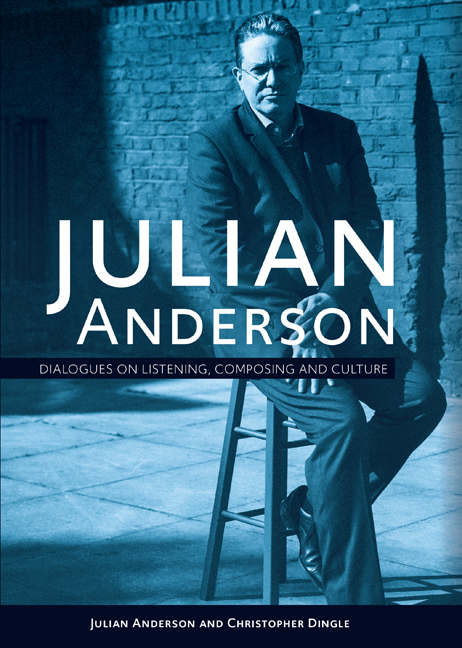Book contents
- Frontmatter
- Contents
- List of Illustrations
- Foreword
- Acknowledgements
- Introduction
- Prelude – Jeux: A Conversation Over Lunch
- Conversation One Origins
- Conversation Two Enthusiasms
- Conversation Three Training
- Conversation Four Dance
- Conversation Five Folk
- Conversation Six Composing (or Not)
- Conversation Seven Understandings
- Conversation Eight Beginnings (and Endings)
- Conversation Nine Puzzles
- Conversation Ten Singing
- Conversation Eleven Olly
- Conversation Twelve Memory
- Conversation Thirteen Opera
- Conversation Fourteen Practices
- Conversation Fifteen Outsiders?
- Conversation Sixteen Quartets
- Conversation Seventeen Advocacy
- Conversation Eighteen Partnerships
- Coda: Multiple Choices
- Chronology
- List of Personae
- Glossary of Musical Terms
- Macrotonality
- Catalogue of Published Works by Julian Anderson
- List of Recordings of Julian Anderson’s Music
- Bibliography
- Discography
- Index
Introduction
Published online by Cambridge University Press: 16 September 2020
- Frontmatter
- Contents
- List of Illustrations
- Foreword
- Acknowledgements
- Introduction
- Prelude – Jeux: A Conversation Over Lunch
- Conversation One Origins
- Conversation Two Enthusiasms
- Conversation Three Training
- Conversation Four Dance
- Conversation Five Folk
- Conversation Six Composing (or Not)
- Conversation Seven Understandings
- Conversation Eight Beginnings (and Endings)
- Conversation Nine Puzzles
- Conversation Ten Singing
- Conversation Eleven Olly
- Conversation Twelve Memory
- Conversation Thirteen Opera
- Conversation Fourteen Practices
- Conversation Fifteen Outsiders?
- Conversation Sixteen Quartets
- Conversation Seventeen Advocacy
- Conversation Eighteen Partnerships
- Coda: Multiple Choices
- Chronology
- List of Personae
- Glossary of Musical Terms
- Macrotonality
- Catalogue of Published Works by Julian Anderson
- List of Recordings of Julian Anderson’s Music
- Bibliography
- Discography
- Index
Summary
This is a book rooted in conversations. It is an attempt to capture the kinds of dialogues we were having for some time before we thought to start recording them, and shall hopefully continue to have for a long time to come. They were informal, often by phone, would frequently last an hour or two and were unpredictable in nature, discussing not just a wide range of music, but much else besides. As befits the frequently serious subject matter, they were often punctuated by laughter. What follows reflects some of that spirit. Lest there be any mistake, this is a book about Julian Anderson's music and thought. There is plenty of the interview format that typifies books of conversations with composers, exploring Julian's life and works. Nonetheless, there are also passages that reflect the broader exchange of ideas and enthusiasms, ranging beyond Julian's music – indeed, beyond music into broader culture and society. Hence the term ‘dialogues’ since, while Julian is the focus, he is not merely responding to a neutral questioner with ex cathedra statements and, as a consequence, the conversations often take unexpected turns.
The conversations spanned several years, starting in early 2014, when Julian was completing his opera, Thebans. The overwhelming majority took place across the following two-and-a-half years, with a couple occurring after that. We set no time limit on our talks, allowing thoughts and ideas to progress as seemed necessary. The final conversation we recorded was neither planned nor expected: by chance, we happened to be meeting on the day in July 2018 that Oliver Knussen's death was announced. We took the opportunity to capture Julian's immediate reflections on a composer he knew personally for longer than any other.
Turning the more than thirty hours of recordings into the eighteen conversations in this book was not straightforward; the raw material was at times used merely as a starting point. Each conversation has its foundation in one or two of our sessions, and there have been several levels of editing. We have had no qualms about refining our phraseology. Material from some sessions is disbursed among several conversations. While some passages of conversation took place before or after a certain date, this does not mean that the entirety of that conversation occurred then.
- Type
- Chapter
- Information
- Julian AndersonDialogues on Listening, Composing and Culture, pp. 1 - 3Publisher: Boydell & BrewerPrint publication year: 2020



